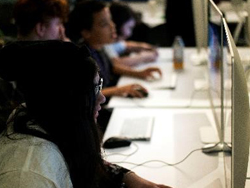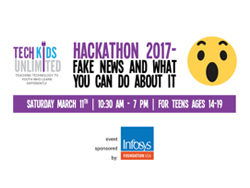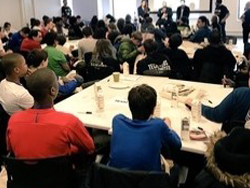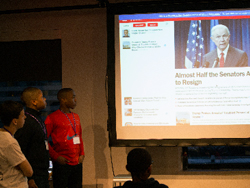Hacking a Hackathon to Best Suit the Educational Needs of Special Needs Students
by Beth Rosenberg @edubeth1 | August 01, 2017
An educator with over 20 years' experience teaching both students and teachers, Beth Rosenberg founded Tech Kids Unlimited in 2009, after realizing that her son who learns differently, loved technology but wasn't being exposed to it during the school day. She is on the faculty at NYU-Tandon School of Engineering in the Department of Technology, Culture & Society. She consults on special needs, education, art and technology programs at cultural and community organizations.
In the US, the Center for Disease Control notes that 1 in 68 children are diagnosed with autism spectrum disorder (ASD). Many children on the spectrum intuitively understand technology. Computer code is predictable, rote and follows a set of finite rules – which makes it comfortable for many of these youth. However, many ASD students are not given the opportunity to further their passion related to technology and computer science at school, as they are inundated with therapies throughout their school day, including speech/language, occupational therapy, physical therapy, social work appointments and more. Most schools do not have the time or monies to teach 21st century technology tools beyond the basics (Word, PowerPoint and Excel) to ASD students.

Tech Kids Unlimited (TKU), a New York City-based not-for-profit education organization, focuses on opening up the field of computer science (CS) principles and technology skills to students with disabilities, especially those with ASD to help them become the techies of tomorrow. TKU recognizes that everyone seeks a life that is valued and purposeful. In today’s society, students with ASD are confronted with biases, prejudice, and a lack of opportunities. The Pediatrics Journal published an article in 2012: "Postsecondary Education and Employment among Youth with an Autism Spectrum Disorder." which reported less than half of students with disabilities graduated from high school and even fewer were privy to meaningful jobs. Those statistics, five years later, still ring true.
With limited employment options available to individuals with autism, TKU works to open the doors to the field of technology so students can learn 21st century skills to participate in the future workforce. TKU is working to change the paradigm for education and employment for young people with disabilities by creating, developing and sharing the tools of technology in a supportive and nurturing individualized environment. ASD students are taught both hard and soft skills needed to succeed in the workplace.
A grant from Infosys Foundation USA helped TKU to offer a first-ever special needs Hackathon: "Fake News and What You Can Do About It". Held in March 2017, the event hosted 57 ASD students and was staffed with 25 counselors, 7 teachers, and 4 social workers – all on hand throughout the day to provide greater hands-on support for ASD students, in both academic and social/emotional situations.

TKU enlisted the help of journalists and comedians to talk about the news to engage the students around the issues of media literacy. Students learned about fake news from a panel of journalists from The Wall Street Journal and The Guardian. Students also met and discussed fake news with Hasan Minhaj, comedian and senior correspondent on the satire show The Daily Show with Trevor Noah.
From there, the students moved into learning new skills and spent the afternoon working in groups creating digital projects. Students were grouped together based on their interest and level of CS knowledge and worked with the counselors on their projects. The tech teachers worked on giving mini-boot camp workshops on a variety of needed technologies such as: UX Design, Programming, Photoshop, and more.
Students learned the mechanics of visual communication via graphic design using photo-editing tools—commonly used to generate “fake news” and also toyed with web fundamentals in HTML and edited videos in a video remixing class. The students prepared their projects--viral memes, videos and website banners and then rehearsed their oral presentations with their team counselors; final presentations of their work closed out the day and each student received an award for participation. Each student left the event with greater awareness about fake news and new technical skills.

TKU's goal is to level the playing field for youth with disabilities who want to be creators and producers of digital culture and this aligns very well with the mission of Infosys Foundation USA to bridge the digital divide through CS and coding skills for underrepresented individuals. Students with disabilities are often left out of the conversation around underrepresentation and diversity and organizations need to expand their definition to include disability. The Hackathon helped build the TKU community of diversity in disability, in a very individualized and nurturing environment.

TKU took a typical technology event—the hackathon and “hacked” it to suit students’ needs by giving them guided team-based activities in a non-competitive but goal-oriented environment. The Fake News Hackathon targeted problem solving and teens focused on collaboration, content and creativity. TKU created a safe and fun community event for these kids to enjoy on the weekends, especially in the middle of a harsh NYC winter. At the Fake News Hackathon, teens got the chance to be teens with other teens. As a result of this event, TKU reached an additional 25 students and 10 of those students are now regulars at TKU’s Sunday workshops. For example, Sara was a first-time participant. She now comes weekly and really admires her teacher Helen as a technical role model. TKU is eager to scale this approach on a national level with other organizations. Another student shared this: "I will critically think about what is being told to me before accepting it as truth. I learned that lots of news presented to the public today is fake and invalid".
Post-Hackathon Comments from Parents:
"He has mentioned media bias, that he is media savvy, and told us about the shift over time from print news to online news and how that relates to advertising revenues thus influencing what is reported."
"He learned, how to be more savvy about what he's reading and hearing, which is very important.
"When my child saw a news headline on my computer, he said he needed to see the website, to figure out if it was mainstream, and then wanted to cross reference the news story with another major news outlet before he would believe it to be true."
"This was a terrific event. Well organized, wonderful giveaways, my child described it as interactive and fun."
"A great experience. Now my son wants to attend the Sunday sessions (I will sign him up)."

